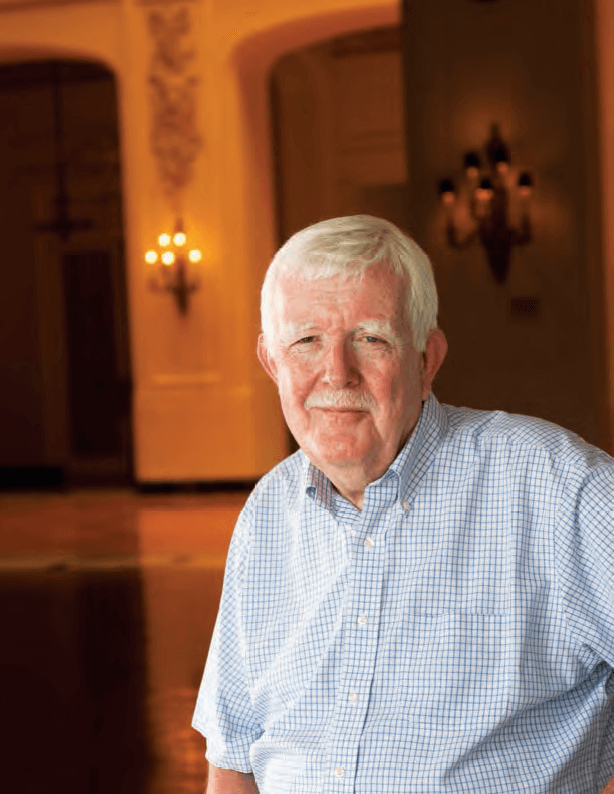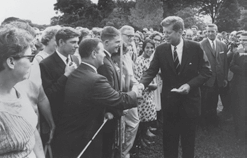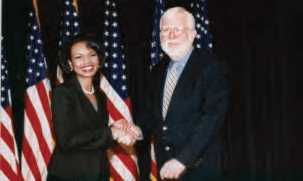
Courageous Journey
When John Kennedy shook my hand and welcomed me as an employee of the U.S. Peace Corps in 1962, he should have fired me on the spot because I was a criminal. The only crimes more serious than being a homosexual were murder, rape, and treason. I was also ineligible for employment with the U.S. […]
When John Kennedy shook my hand and welcomed me as an employee of the U.S. Peace Corps in 1962, he should have fired me on the spot because I was a criminal. The only crimes more serious than being a homosexual were murder, rape, and treason.
I was also ineligible for employment with the U.S. government because I was, according to the American Psychiatric Association, insane. In 1962, homosexuality was listed by the American Psychiatric Association as a mental disorder, treatable by frontal lobotomy—the removal of the front quarter of the brain—and electroconvulsive therapy, a violent and pointless “treatment,” which causes seizures and loss of brain tissue.
As part of the first Peace Corps group to train in Washington, D.C., every liberal in town wanted to have his or her picture taken with us. I had tea with the Kennedys in the Green Room of the White House before departing, and was greeted by Emperor Haile Selassie I in Addis Ababa when I arrived in Ethiopia. Heady stuff for a 21-year-old-kid from Monmouth.
Fresh out of Peace Corps training; twelve weeks at Georgetown, two at Addis Ababa University in the Ethiopian highlands; I was one of only a handful of outsiders who had the privilege of living in the western lowlands of Eritrea when the war between Eritrea and Ethiopia broke out.
I was sensitive to the non-political nature of the Peace Corps and did not want to embarrass the institution by taking sides. At the same time, I wanted the people I lived and worked with to understand that I understood their predicament. It was a narrow tightrope to walk.
After Eritrea gained its independence, I was one of the first country officers for Eritrea at the State Department. In that capacity, I was responsible for all official contacts with Eritrea.

I was never a “normal” foreign service officer (FSO). When I entered the foreign service on April Fools Day in 1965, 95% of FSOs had graduated from five schools—Harvard, Yale, Princeton, Stanford, and U.C. Berkeley. I was the son of a widowed immigrant house cleaner. I grew up in a garage and graduated from someplace called Monmouth College with an unimpressive 3.2 GPA. I probably had the lowest passing score on the Foreign Service written exam in ’63.
I didn’t know it at the time, but Hubert Humphrey was putting a lot of pressure on State to hire returned Peace Corps volunteers. I was the second one to take the orals. To my total surprise, the Board of Examiners rolled out the red carpet, hurried the background investigation, and I took the oath less than five months later.
During my first tour in Jeddah, on the port on the Red Sea, I got married as all FSOs did. One’s wife was rated on one’s efficiency report. No wife, no career.
After Jeddah–considered a major hardship post in the mid-’60s—the State Department rewarded me with an assignment to Paris, but I feared that the temptations on the streets of Paris might overwhelm my determination to stay in my marriage and in the closet. I also thought that I could recreate my wonderful Peace Corps experience in another part of Africa. I begged for an assignment to a now-closed consulate at Kaduna in northern Nigeria. Sometimes one’s prayers are answered.
My experience in Nigeria was a disaster. My wife and I arrived in Kaduna three months after the slaughter of the Ibos and the outbreak of the Biafran War that eventually killed two million people.
My supervisors and colleagues had witnessed a holocaust and were badly scarred psychologically. They watched as human beings were hanged from every tree, drowned in open sewers, burned to death in front of the consulate. My predecessor and his four children sat and listened as their nanny and her four children were beaten to death in the backyard. In those days, FSOs and staff got no psychological services from the State Department.
My direct supervisor shot himself in the head after he was “selected out” by the Foreign Service. No officer who was present for the slaughter ever got promoted again.
I was miserable. I had hoped that marriage would cure my homosexual “tendencies,” but pretending to be straight got more difficult every night. I was riddled with guilt over the lie I was living and its effect on my wife. She gave me the best years of her life; yet I knew that the marriage had to end. But how do you do that in Nigeria? And where was I to go after divorce?
The option of a relationship with a man never even occurred to me. It was never done in those days (except, of course, by J. Edgar Hoover).
A week after the Stonewall Riots, when I was living in Nigeria, Newsweek magazine ran a cover story on something called ‘Gay Liberation.’ I had never heard the word gay used in any context except to mean happy.
I was well aware of the State Department’s obsession with ferreting out homosexuals. In their zeal, they also ferreted numerous heterosexuals on flimsy charges of gayness. Surely I would have to change careers if I was going to come out.
Things changed in America because in 1969 a group of Latino drag queens at a New York gay bar called the Stonewall fought back when the police came to arrest them for merely being present in such an establishment.
One of them was an illegal alien from Venezuela. He feared deportation so he jumped out the window of the police station as he was being booked and impaled himself on an iron spike guarding the station. His screams brought thousands of neighbors out onto the streets who rioted for three days, shutting down lower Manhattan. Homosexuals were no longer non-existent.
A week after the Stonewall Riots, when I was living in Nigeria, Newsweek magazine ran a cover story on something called “Gay Liberation.” I had never heard the word gay used in any context except to mean happy.
One of the people they quoted in that article was Don Kilhefner, who had been one of my best friends in the Peace Corps. They identified him as the director of the Gay Community Services Center of Los Angeles.
Don did not tell the Newsweek reporter that at the time the Gay Center was nothing but a Monday night meeting in the back room of a laundromat. Today, it is one of the largest gay institutions in the world.
When I read that Don had come out, I decided that I could do the same. Coming out is not only a powerful act for oneself, but for one’s friends and families as well. I should note that I feel terribly guilty about getting married, but in 1966 all gay people married—being single aroused suspicions—and I told myself that having access to sex with women was all I needed to cure my disease.
A year later, back in Washington, after we separated, I made my first forays to the gay bars of Washington. Up to that point, the only gay community I had ever seen was a gaggle of transvestite hookers on 42nd Street. I was amazed to find that the Lost and Found and Pier Nine, Washington’s discos, were patronized by a lot of charming, intelligent, good-looking men (OK, there were some toads too) who called themselves gay. At age 30, I had discovered heaven.
A few months later, in early 1972, the State Department sent me on a two-month tour of duty to inspect the Passport Offices in San Francisco and Los Angeles. The minute I got to L.A., I set out to find Don Kilhefner and the Gay Community Services Center. By then it had moved out of the laundromat and into the weirdest house in L.A. County—a tumbledown Addams Family-esque Victorian on Wiltshire.
I was sure that State Department Security would surely get pictures of me walking up those rickety steps. I was sure that the police were taking my picture. I wasn’t wrong. The LAPD were actively trying to destroy the Center.
Somewhere on the second floor I found Don, whose hair had moved from his head to his chin, presiding over it all. He welcomed me warmly and brought me to the commune where he lived in Silver Lake. He introduced me to Morris Kight, one of the grandfathers of gay liberation, and a world full of people with names like Strawberry and Morning Glory, the craziest crowd of dykes and drag queens I had ever seen.

I’m quite sure that I was the first person in the Foreign Service who had ever spoken to such people, let alone claiming them as my brothers and sisters. They were all intensely political, and I came back to Washington inspired.
In L.A., I decided that while I am not a public personality, and I did not seek notoriety, I would also never again hide my gayness when it was relevant to any social situation.
Back in Washington, I joined the brand-new Gay Activist Alliance (GAA). In 1973, the GAA ran a conference in Washington on the relationship between gay people and the U.S. government. One of the panels was on the subject of government employment. As I worked as a volunteer planning that conference, I decided that I had something important to say, and that I needed to keep my promise to myself not to hide in the closet in any important social situation. I volunteered to speak.
When the day arrived I was a nervous wreck. I was sure that my mother, an Irish Catholic immigrant, would be disgraced at St. Mary’s Church in Deal, New Jersey, if my actions brought on another cover story in Newsweek. I would surely lose my job, and I had no money in the bank and no other job prospects.
But I spoke anyway about how the State Department bragged about firing two homosexuals every week. I talked about how straight people were often falsely accused and discharged. I talked about the history of McCarthyism at the State Department. When I was finished, one of the questioners asked how the State Department treated me personally. I said that they did not know I was gay.
“I guess this is a coming out party,” I said.
The room stood up and gave me my first standing ovation. It was worth all the anxiety. I had just become not only the first U.S. Foreign Service Officer to come out voluntarily; I was also the highest officer of any government in the world at the time to do so. Other people were dragged out of their closets when they got caught by the police in compromising situations. I proudly opened my own closet door and walked out.
I had just become not only the first U.S. Foreign Service Officer to come out voluntarily; I was also the highest officer of any government in the world at the time to do so. Other people were dragged out of their closets when they got caught by the police in compromising situations. I proudly opened my own closet door and walked out.
The next day the Washington Post published the story of the GAA conference and noted that a Foreign Service Officer was one of the speakers. At the time of the speech the reporter asked if I wanted my name in the paper. I told her that was her decision. She did not print my name, but the program for the event was an open document that did include my name.
I sat back and waited for the call telling me that I was fired. Oddly, the call never came. I’m not sure if the State Department simply decided that they could not fire me on the grounds that I could be blackmailed—the excuse they used to fire so many others—since by being public I could not be blackmailed.
Or perhaps they simply didn’t read the Style Section of the Washington Post. Gays were then considered to be a cultural group, not a real political force.
In 1973, I took 10 months of leave without pay to work on a master’s degree in social work at the University of Southern California. Once again, I headed directly for the Gay Center. I started volunteering as a peer counselor.
At that time there was not a single psychiatrist, psychologist, or social worker who had come out of the closet, so we had to support our own community with well-intentioned, but unschooled, volunteers. Even though I was only a first-year social work student, I had more credentials than any of the other peer counselors and soon found myself serving as director of Peer Counseling. It was a wonderful roller coaster ride. Our clientele ranged from wealthy businessmen and housewives from the San Fernando Valley to drag queens and lesbian hookers who, respectively, worked Santa Monica and Hollywood Boulevards.
There were all sorts of support groups, including one that gave support to gay men who wanted to have sex change operations in order to become lesbians. We all knew that the world would never be the same after it had dealt with us.
To my total amazement, the State Department offered me a year of university training for the second year of my master’s.
I returned to the department to pay off the commitment I made to get university training. Instead of being fired, I was given a very rapid promotion, from FSO-3 to FSO-2 after only 14 months of active duty, something that isn’t even possible any more.
I was assigned as deputy principal officer (a title that no longer exits) at Guayaquil in Ecuador. I was posted as American consul general in Ecuador. In that job, at age 34, I served as the youngest chief of a major American diplomatic post in the modern history of the Foreign Service. I enjoyed it, but it wasn’t California.
Although my career was soaring, I knew that as an openly gay man, my career prospects in the long run were not positive. I should note that with the advent of gay liberation, at least one Foreign Service Officer fought back legally after he was found in an “embarrassing” relationship. I believe he lost his case. My claim is that I was the first to challenge the State Department voluntarily without having been found in a compromising situation.
And so, two years later, I left the job I had wanted since the fourth grade, moved to San Francisco, and spent 21 wonderful years running mental health clinics for street crazies there.
At age 50, I looked at my retirement potential and realized that I would be retiring on $33,000 a year. Catastrophe!
I decided to go back to the State Department for my last decade of work so that I could regain my federal retirement benefits. In 1994, it was no longer against the law for homosexuals to work there. But homophobia had not been erased. My reappointment was delayed by seven months while I waited for a security clearance. When the man who was hiring me called security to find out why things were taking so long, they replied that during my security investigation one of my friends had said that I was gay and they were not sure if she meant that I was a homosexual or that I was carefree and frivolous. I told him to tell them that I was all three.
One former colleague and “friend,” now an ambassador, refuses to speak to me.
A Deputy Chief of Mission for whom I worked thought I was the cat’s meow, until an article appeared in the Foreign Service Journal on gays in the Foreign Service that mentioned me by name. He never spoke a civil word to me again.
I firmly believe that gays make particularly good diplomats. We grew up removed from the dominant culture—outsiders looking in, just like diplomats in a foreign land. We were the boys who didn’t get into fights learning to survive by our wits, and often by means of our camp humor. We figured out how to get along with both sexes and with people whose orientation was very different from our own. Nature left gay genes in the pool for many reasons: Without us, there is no art and little sense of beauty. Perhaps gay genes are similarly crucial to the diplomatic process.
I recently marched in the Washington Gay Pride parade with a group of 80 members of GLIFAA: Gays and Lesbians in Foreign Affairs Agencies. Among the marchers with our group was the Deputy Assistant Secretary of State for Human Rights and His Excellency the Ambassador of the Kingdom of Spain to the United States of America.
As an American, I am proud that these amazing changes began in a small bar in my country and have since spread to the rest of the world. We’ve come a long way. Be careful and never forget the history, but at the same time, please don’t ever stop being carefree and frivolous.
This article originally appeared in the Summer 2012 issue of Monmouth magazine.